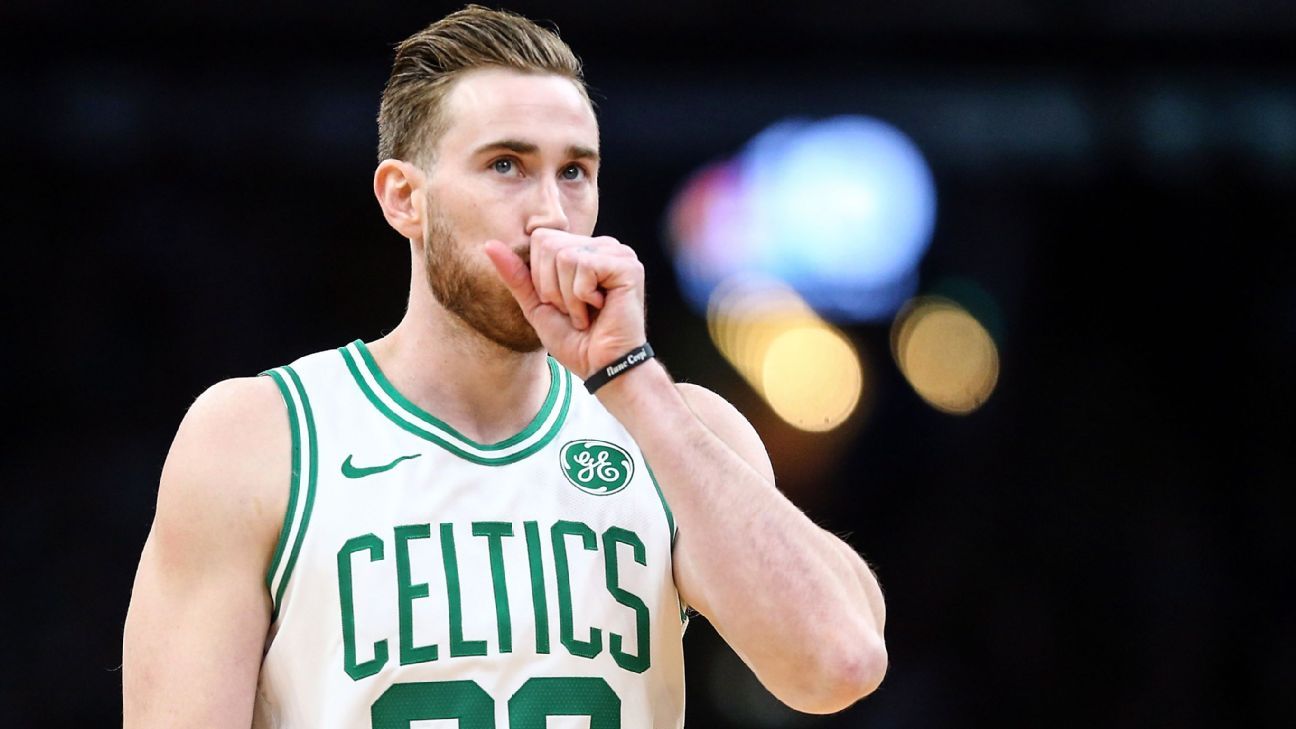BOSTON — When this season began, the Boston Celtics seemed destined for greatness. The team was within a few possessions of reaching the NBA Finals without Kyrie Irving and Gordon Hayward last season, and with those two back — and LeBron James having abdicated his throne atop the East — Boston, in the eyes of many, was poised to retake its once-customary place atop the conference.
As it often is, though, reality has proved far more complicated. And as Boston prepares to host the Golden State Warriors Saturday night on ABC — in a preview of what many expected would be the NBA Finals matchup a few months from now — the main reason for the Celtics’ struggles, while obvious in retrospect, wasn’t given enough attention when that preseason analysis was rendered:
Gordon Hayward isn’t back yet.
Hayward has in fact been playing for the Celtics all season. But there’s a difference between being back and being back. And that difference, more than anything else, explains why the Celtics enter Saturday’s game mired in fifth place in the Eastern Conference, having so far failed to live up to their lofty preseason expectations.
“I think with each month I feel more comfortable,” Hayward told ESPN last week. “Sometimes, I need to remind myself it’s good to even be out there, and to try to find the joy in just playing, [and] not get frustrated if things aren’t going exactly how I want them to.”
This is the conundrum that both Hayward and the Celtics find themselves in. It would be foolish to suggest that his uneven return to the court is his fault. In many ways, it simply is a success that he’s able to be on the court and producing anything at all after a devastating injury and a rehabilitation process that included at least one setback.
But professional sports is an unforgiving business. In Hayward’s absence, the expected hierarchy of the Celtics shifted. Jayson Tatum and Jaylen Brown helped catapult Boston to heights it wasn’t expected to reach last season after Hayward was lost. The same could be said for Terry Rozier, who ably filled in for Irving during Boston’s playoff run.
This season, the returns of Hayward and Irving have forced all three young players to accept a reduced role. Irving has been spectacular, averaging 23.5 points and career highs in both assists (6.9) and steals (1.7) per game, making his role unquestionable.
Hayward, though, has looked far more pedestrian. For every flash of the player he was before the injury — games of 30 and 35 points against the Minnesota Timberwolves, and 16 points in the first half of last week’s victory over the Toronto Raptors — there has been another where he has been unnoticeable, such as when he was scoreless in 22 minutes during a loss in San Antonio, or scoring three points in 25 minutes in a lackluster defeat at Brooklyn last week.
“I think just focusing on what I’m doing when I have the ball, and I guess just trying to be aggressive when I do get opportunities,” Hayward said. “[I’m] judging those, and not judging numbers or anything, because it’s going to be different every night. We have so many guys, and sometimes guys are hot and for whatever reason you don’t get as many touches.”
Complicating things further, Hayward is now coming off the bench for the first time since 2012-13. His reserve role and his attempts to re-acclimate himself to the rigors of playing a full NBA season after a year away make it difficult for everyone — including himself — to judge how he’s playing on a nightly basis.
“You’re not going to always be able to judge yourself or have others judge you based on how many points you score,” Celtics coach Brad Stevens said. “There’s a lot of other things that you do in a game. So, if he has 16 one night but 10 the next or 6 the next, he could still be impacting the game just as much because he’s forced to be a passer, maybe he’s defending a different position, you know, who knows?
“So, I think he’s been pretty consistent. … There’s going to be nights where those guys off the bench get more opportunity to shoot and there’s going to be nights where there’s not as much, and that’s one of the challenges of being in that role.”
Just chalk it up as yet another challenge for Hayward to overcome, and for the Celtics to navigate as they continue to attempt to get him back to being the player who was the league’s most coveted free agent less than two years ago.
That status is precisely why, despite the many ups and downs his season has gone through so far, the Celtics continue to run Hayward out there for significant minutes on a nightly basis. That decision, at times, has frustrated the younger members of the team, who see Hayward as an impediment to the roles they grew accustomed to.
For Boston, though, continuing to give Hayward minutes is not only an easy call — it is the only reasonable call to make.
There is one path to the Celtics becoming the team so many expected them to be this season. For the Celtics to find that path, Hayward needs to become his pre-injury self again, or at least something resembling it, by the first week of May.
If that happens, Boston has a very real chance to do the things it was expected to when this season began. But if it doesn’t? Well, the championship-contending aspirations so many had for the Celtics will remain figments of their imaginations.
“It’s a long season,” Hayward said, “and [I’m] trying to be at my peak form at the end of the year.
“[I’m] just trying to slowly work my way back to that.”
“Sometimes, I need to remind myself it’s good to even be out there, and to try to find the joy in just playing, [and] not get frustrated if things aren’t going exactly how I want them to.”
Gordon Hayward
All of this makes analyzing this Celtics season so complicated. The two biggest questions about this team — what version of Hayward will be in uniform for the playoffs, and whether the nagging knee tendinitis Al Horford has been playing through this season will remain a factor — can’t be affirmatively answered until May and June roll around.
It also has been a key ingredient in much of the drama that has surrounded the franchise thus far. Basketball teams typically have a clear hierarchy, one that helps delineate roles and responsibilities. A healthy version of Hayward — the one Boston went into last season planning on having, and into this season hoping to — would give the Celtics a clear one. This version of him, however, has left it muddled.
As a result, the team’s young players have been frustrated, and Irving has exacerbated those frustrations at times with his comments in the media about them. Boston’s overall inconsistent play, including losses to the New York Knicks, Phoenix Suns and twice to the Orlando Magic, hasn’t helped, either.
Individually, all of these things are explainable, and understandable. But it doesn’t change the fact this season has been a disappointing and uneven one thus far for the Celtics. It has left many underwhelmed with a group that was expected to be among the league’s elite, but so far has not been.
All of this will be forgotten in a few months, however, if the season ends with Boston back in the NBA Finals for the first time since 2010. Whether that happens could very well be answered with one question:
Is Gordon Hayward back yet?
So far, he isn’t. To get where they want to go, the Celtics, at some point, need that to change.


